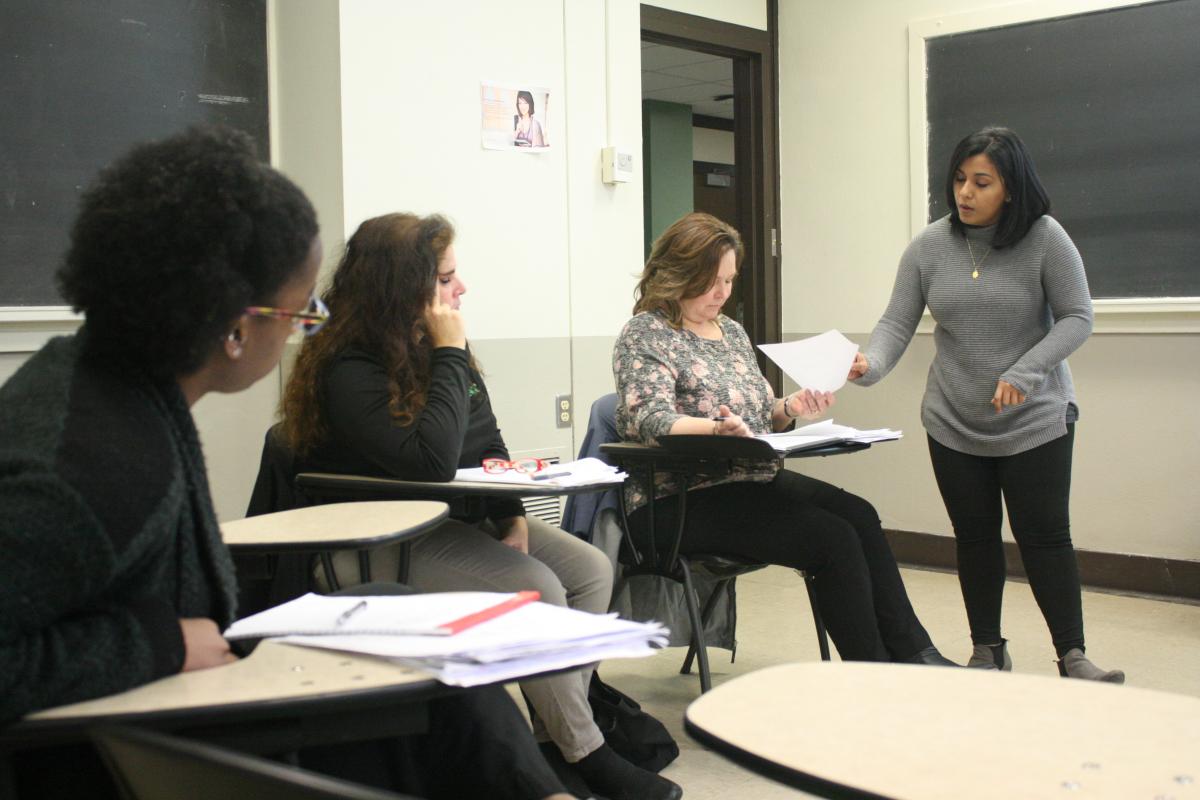Giving faculty and staff an edge
March 28, 2019
 When Jerry Lacey walked into the President’s EDGE office gripping a freshly printed
piece of paper, the joy on his face was palpable.
When Jerry Lacey walked into the President’s EDGE office gripping a freshly printed
piece of paper, the joy on his face was palpable.
And so was the pride on the face of Kemper Rao.
“You got it!” Rao exclaimed as she offered Lacey a hug.
It was a copy of Lacey’s certificate of high school equivalency, or GED, which he
earned at the age of 32 after a year of working with Rao and others at The President’s
EDGE. Lacey, a plumber in the UNT Auxiliary Maintenance department, said working with
The President’s EDGE tutors was a “confidence builder” and helped him make up for
the time he lost after dropping out of school in ninth grade.
“I’m really excited for myself,” Lacey says.
The President’s EDGE — Employee Directed General Education — is a joint initiative
of the President’s cabinet and the College of Education, which provides employees
support and opportunities for advancement within the UNT community. It opened its
doors in the spring of 2011 as a program to assist staff members studying for their
high school equivalency certificate.
Rao has served as the program’s part-time director since September 2016. She learned
to speak Spanish when she was 10 years old from a neighbor from Cuba and holds degrees
in biology and French. She taught school in Louisiana for a time and later worked
for U.S. Customs before becoming a stay-at-home mom and moving to Texas.
“I was interested in languages. I like languages. I always have,” Rao says.
After moving to Texas, Rao began working as a substitute teacher for the Lewisville
Independent School District, but it was a connection she made while teaching in Louisiana
with Rosanna Boyd, director of Bilingual/ESL Education programs in the College of
Education, that brought her to UNT and the President’s EDGE.
“The people we serve are staff and employees, not students, but the people who support
the students,” Rao says.
Started primarily as a way to assist employees seeking their high school equivalency,
Rao says the program began expanding when they realized that many of the people who
needed help earning a GED also needed help learning English and computer skills.
“These are people who are cleaning offices and vacuuming the floors, so they never
get a chance to use a computer,” Rao says. “They come in early mornings, and we are
teaching them how to type and about parts of the computer — job skills they can take
forward.”
Breaking down barriers
Tutors at The President’s EDGE include student workers like Crystal Moulden-Lindsey,
an undergraduate majoring in linguistics, who teaches an English as a Second Language
class.
“We’ve tried to make those English classes relevant to work, so it’s career- or work-related
English,” Moulden-Lindsey says. “My goal with the English classes is to learn about
my students and show them that there is a way to learn that is accessible and doesn’t
make them feel stupid.”
Moulden-Lindsey says the biggest challenge in teaching English as a Second Language
to adult learners is the varying levels of understanding the staff members already
have. Some may already speak a good amount of English while others may understand
only one or two phrases.
“What we’re finding is they’re shy about speaking English — they have a heavier accent
and they’re tired of people sitting there and saying, ‘What, what did you say?’” Rao
says.
Mary Clavijo Molina is seeking her Master’s degree in Business Administration and
works as a graduate assistant in The President’s EDGE. A Colombia native, she says
she understands why some native Spanish speakers are shy about speaking English.
“My mom doesn’t speak English because we laughed at her and now she stopped trying.
That’s our culture. That’s why we are like that,” Molina says.
Something for everyone
In 2017, The President’s EDGE added a Spanish for Staff course. Broken down into eight
modules that meet for one hour a week for four weeks, the course is taught at varying
times throughout the year. Molina began teaching the classes in the fall.
“I know Spanish, and I like to teach. If someone wants to learn, I like to be that
person who teaches them. So this is fulfilling,” Molina says.
The President’s EDGE also offers help with citizenship studies and resume assistance.
The program will work to create custom classes for departments and offers a “plus
one” option for employees’ immediate family members who may want to join them in learning.
The program is funded through the President’s office and administered out of the Educator
Preparation Office in the College of Education. It has a six-member board of advisors
and, according to Rao, works to support all staff and employees at UNT, even if their
mission still focuses on helping people obtain their GED.
“There’s always more to work through than just information when it comes to the GED.
There’s a lot of fears,” Rao says. “You get to deal with the people who slipped through
the education system for one reason or another.”